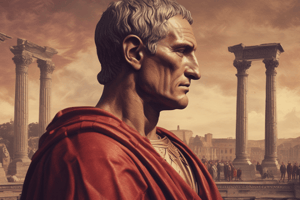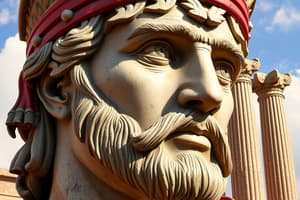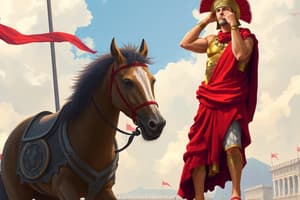Podcast
Questions and Answers
What was the alliance called that Caesar formed with Pompey and Crassus?
What was the alliance called that Caesar formed with Pompey and Crassus?
- The Caesarian Pact
- The Second Triumvirate
- The First Triumvirate (correct)
- The Roman Triad
What was the primary factor that led to the breakdown of the First Triumvirate?
What was the primary factor that led to the breakdown of the First Triumvirate?
- Conflicting interests among the members (correct)
- Caesar's victory over Gaul
- Pompey's growing popularity
- Crassus' death in battle
How did Caesar solidify his power after his victory over Pompey?
How did Caesar solidify his power after his victory over Pompey?
- He formed a new alliance with other wealthy patricians
- He became both the dictator and the absolute ruler of Rome (correct)
- He declared himself the new Emperor of Rome
- He disbanded the Roman Senate and ruled alone
What was Caesar's primary base of support among the Roman people?
What was Caesar's primary base of support among the Roman people?
What year did the civil war between Caesar and Pompey begin?
What year did the civil war between Caesar and Pompey begin?
What was Caesar's primary motivation for seeking the title of dictator for life?
What was Caesar's primary motivation for seeking the title of dictator for life?
Which of the following best describes the immediate consequence of Caesar's assassination?
Which of the following best describes the immediate consequence of Caesar's assassination?
Which of Caesar's reforms continues to have a significant impact in modern times?
Which of Caesar's reforms continues to have a significant impact in modern times?
In which of Shakespeare's plays is the character of Julius Caesar prominently featured?
In which of Shakespeare's plays is the character of Julius Caesar prominently featured?
What did the Latin word "Caesar" eventually come to signify in various languages?
What did the Latin word "Caesar" eventually come to signify in various languages?
Flashcards are hidden until you start studying
Study Notes
Julius Caesar: A Tragic Hero and the End of the Roman Republic
Julius Caesar, born on July 12 or 13, 100 BC, was a remarkable figure whose influence extended beyond the borders of ancient Rome. As a gifted orator and strategist, he rose to prominence during the tumultuous times of the late Roman Republic. However, his meteoric rise ultimately led to his own demise at the hands of those closest to him.
Early Life and Career
Born into the patrician class, Caesar received an education befitting his status. He displayed exceptional talent as a public speaker and soldier, attributes that would serve him well in the political arena. In 60 BC, Caesar formed an alliance called the First Triumvirate with another general, Pompey, and a wealthy patrician, Crassus. This trio effectively controlled the Roman Republic, with Caesar being elected consul.
Caesar's career was marked by numerous accomplishments. He conquered Gaul (modern-day France) between 58 and 50 BC, establishing a strong base of support among the common people. When the triumvirate broke down due to conflicting interests, Caesar declared war against Pompey's forces in 49 BC, which ended with Caesar's victory over Pompey in 48 BC.
Upon returning to Rome in 46 BC, Caesar consolidated his power, becoming both the dictator and the absolute ruler of Rome and its territories. During his reign, he implemented various reforms, including founding colonies, reducing the number of slaves, opening citizenship to non-Romans, and creating the Julian calendar, which remains the basis for modern calendars.
Ambition and Betrayal
In 44 BC, Caesar ordered the Senate to declare him dictator for life. Although this was customarily a temporary role, Caesar intended to maintain his power indefinitely. Fearful of the potential loss of their own power, a group of Senators, led by Marcus Junius Brutus, plotted and executed Caesar on the Ides of March. Despite their intentions, Caesar's assassination marked the end of the Roman Republic and paved the way for the establishment of the Roman Empire.
Legacy and Impact
Caesar's legacy extends far beyond the events of his own life. His various reforms, particularly the Julian calendar, remain in use to this day. Additionally, the Latin word "Caesar," derived from his namesake clan, has been adopted as titles signifying authority in several languages, including German, Russian, and others.
Debated Hero or Villain
Throughout history, opinions on Caesar have varied widely. Some viewed him as a tyrant who seized power, while others saw him as a visionary leader who pushed for reforms. Shakespeare's play "Julius Caesar" continues to fuel the debate, portraying different perspectives on Caesar as a character and examining the complexities of leadership and power.
In conclusion, Julius Caesar was a figure of immense significance in ancient Rome, leaving behind a lasting impact that resonates even today. His life and achievements continue to inspire debates and discussions about leadership, power, and governance.
Studying That Suits You
Use AI to generate personalized quizzes and flashcards to suit your learning preferences.





